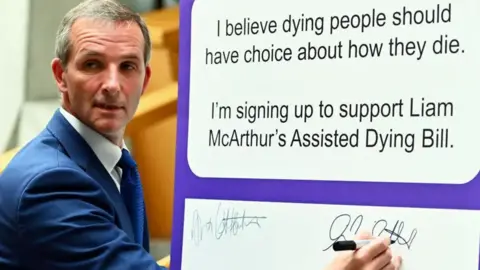Humza Yousaf will vote against assisted dying bill
 BBC
BBCFormer First Minister Humza Yousaf has said he will not vote for a bill which would legalise assisted dying in Scotland.
A new law allowing terminally-ill people to take their own life, put forward by Liberal Democrat MSP Liam McArthur, will be voted on at the Scottish Parliament on 13 May.
Yousaf said there were "not strong enough safeguards" to prevent vulnerable members of society from being coerced into ending their life under proposed legislation.
He joins John Swinney, who succeeded him as first minister and SNP leader, in his opposition to the legislation, adding it would "open a door that cannot be closed".
If the Assisted Dying for Terminally Ill Adults (Scotland) Bill passes, it would allow patients to request medical assistance to end their own life.
However it would only be permitted under strict circumstances - if the person had a terminal illness and had been ruled mentally fit to make the decision by two doctors.
MSPs will be allowed a free vote on the issue at Holyrood next week, meaning parties will not compel their members to back a particular position.
Yousaf, a former health secretary, said he recognised the "sensitivity" around the debate.
But he said he was concerned about the protections for vulnerable and disabled people following dialogue with the Glasgow Disability Alliance.
"You cannot legislate for a safeguard strong enough, there's not one that exists that is strong enough to prevent coercion, particularly against the most vulnerable in our society, particularly against disabled people," he told BBC Scotland.
"The Glasgow Disability Alliance told me of their worries that their members would be made to be seen as a burden on society, a burden on their families, and therefore coerced.
"And you cannot provide or legislate for a safeguard that is strong enough to prevent that."
Is there support for assisted dying?
A bill to legalise the measure in England and Wales passed its first stage at the House of Commons in November.
Scotland has tried to pass similar legislation before - in 2010, the End of Life Assistance (Scotland) Bill failed, followed by an attempt in 2014 with the Assisted Suicide (Scotland) Bill.
The latest Scottish bill has proved divisive, and is opposed by the Catholic Church in Scotland and the Scottish Association of Mosques.
The Church of Scotland is "partially opposed" to the legislation becoming law, but says its official position is currently under review.
Last week Liam McArthur said he would raise the minimum age in the proposed legislation from 16 to 18.
The Lib Dem MSP said he had considered the matter "very carefully" and the change was in line with legislation in the US, Australia and New Zealand.
He has urged MSPs to vote in favour of the bill and help create "the most compassionate, safe and suitable law for Scotland".
 Getty Images
Getty ImagesSwinney announced he would vote against the latest Scottish bill earlier this week.
He said his religious faith had been a factor in his decision and that he had "agonised" over his decision in a way that he did not on two previous assisted dying bills because he considered those to be bad law.
Ally Thomson, the director of the Dignity in Dying Scotland pressure group, said she was "disappointed" with John Swinney's decision not back the bill but she appreciated that he "took the time to speak with dying people who are desperate for this choice".
Yousaf said his Muslim faith did not play a part in his decision, adding he "did not legislate on the basis of faith".
He said his opposition to the bill was "based on a judgment on what would be best for society as a whole".
He said end of life care should not be a "binary choice" between suffering in pain and assisted death, adding that a third option, in the form of "high quality palliative care" should be available.
'No way of closing door'
Yousaf also pointed to the way similar laws in European countries, such as Belgium and the Netherlands, and in Canada had changed over time.
He said the scope of those eligible to seek an assisted death had "widened".
"In Canada where the original legislation was for those with a foreseeable natural death, that clause has now been removed," he said.
"And in a couple of years time, Canada will be debating whether mental illness would meet the criteria.
"In the Netherlands and Belgium, minors are now allowed to take part in assisted dying, to kill themselves, effectively. In the Netherlands, it's children as young as 12, with parental consent."
He added: "If the Scottish Parliament opens the door to assisted dying, there is no way of closing that door.
"The eligibility will extend and there is not a safeguard strong enough to protect the most vulnerable."
